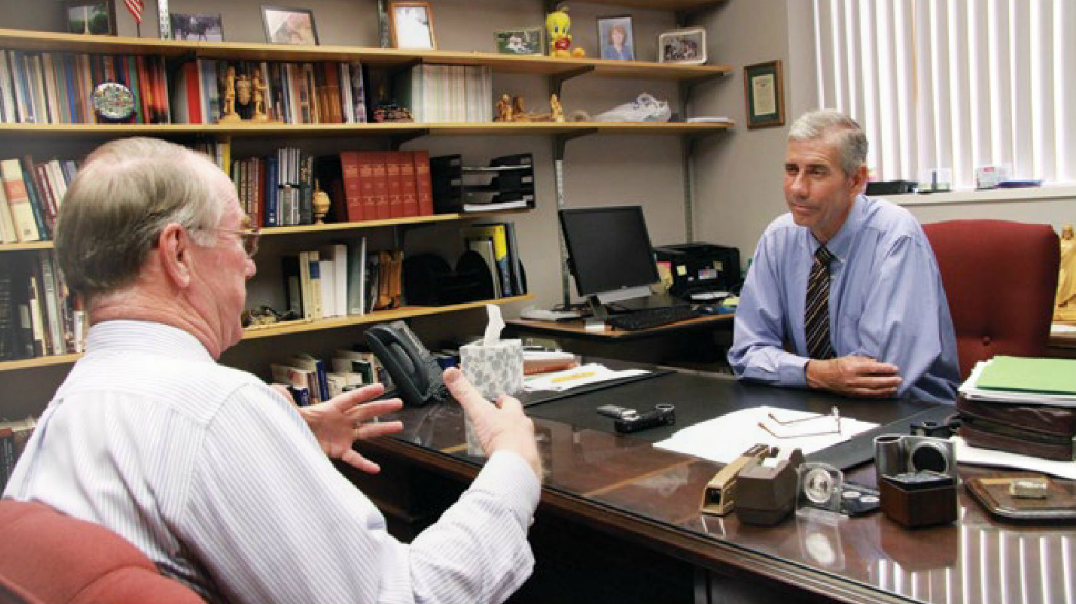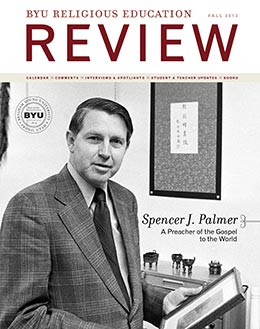A Conversation with Outgoing Dean Terry B. Ball
Dana M. Pike
Terry B. Ball (terry_ball@byu.edu) was a professor of Ancient Scripture at Brigham Young University when this was published. He served as dean of Religious Education at BYU from 2006 to 2013.
Dana M. Pike (dana_pike@byu.edu) was a professor of Ancient Scripture who was appointed as associate dean of Religious Education at Brigham Young University when this was published.
 This interview occurred on June 9, 2013.
This interview occurred on June 9, 2013.
Pike: Thank you for the opportunity of reflecting with us on your seven and half years of service as dean. How did you feel when you were invited to be the dean?
Terry Ball: Frankly, I was a bit overwhelmed and nervous about how the faculty would feel about my appointment. I do not have the intellect or doctrinal expertise of the previous deans that I have personally worked under: Robert J. Matthews, Robert Millet, and Andy Skinner. I worried how the faculty would tolerate a dean with a different skill set. Over the years I have been humbled by and grateful for the support I have received from my colleagues as I have served.
Pike: Would you share with us some of the goals you had when you were appointed dean?
Ball: One goal was to clearly define the mission of Religious Education. A previous version of our mission statement declared that it is “to preach, preserve, and defend the doctrine, history, and scriptures of the Church.” We reworded that mission statement to align it with the mission statement of the university. Today it reads “The mission of Religious Education at Brigham Young University is to help individuals in their efforts to come unto Christ by teaching the scriptures, doctrine, and history of the restored gospel of Jesus Christ through our classroom instruction, gospel scholarship, and outreach to the larger community.”
I am inspired by the vision of that statement. It clearly identifies not only what we are trying to accomplish, but how we are trying to accomplish it. I believe we have been true to that mission over the years. You will note that teaching is first in our list of activities. That is by design. I believe teaching will always be the most important thing we do. We teach about 28,000 students each year. Every four-year graduate of BYU must have at least fourteen credit hours of Religion. That is the equivalent of a minor in Religious Education. Great teaching is critical to our mission.
If you look at peer evaluations of teaching, student ratings, and alumni comments on teaching in Religious Education, you will find that typically our faculty do a marvelous job in the classroom. In fact, alumni surveys have consistently identified religion classes as a highly significant factor in helping them obtain the aims of a BYU education—an education that is spiritually strengthening, intellectually enlarging, character building, and leading to lifelong service and learning.
Scholarship and outreach are also critical to our mission. We have worked hard to share what we have learned with the academy and the community beyond our campus through publication of our research and by participating in and hosting seminars, conferences, and symposia.
Another goal I had when appointed dean was to raise the funds we need to support our work. I have found fund-raising to be one of my most enjoyable responsibilities. It’s been a sweet experience to meet remarkable individuals who have worked hard and been blessed with great resources for their labors. So many are generous, humble people who are anxious to use their resources to help others and build the kingdom. As they have come to understand the mission and value of Religious Education they have been anxious to contribute and help us reach our goals. I’ve met so many wonderful people who have taught me so much and have become dear friends; I hope we’ll be lifelong friends. With their help we’ve reached many of our fund-raising goals. Now our job is to make sure we use those funds responsibly—to assure that every penny goes to accomplish the purpose for which it’s given so the donors can have the confidence that their sacrifice is yielding good fruits and supporting a great cause.
Pike: Those are two significant goals. Were there any others you had?
Ball: Another goal I had was to improve the transfer professor program—the program that allows teachers from other disciplines to teach a religion class. We have had some wonderful transfer professors over the years, but the program had become too unwieldy for us to properly support and administer.
We worked to restructure the program and our support of it. We improved the process for selecting transfer faculty by involving the college deans in the task. We also improved the quality of support we provide transfer professors by improving our pre-service training, offering online teaching resources and support and holding weekly in-service training for them. We also were fortunate to obtain two Teaching and Learning Fellowships that have allowed several of our faculty to train, support, and mentor new or struggling transfer professors. The results have been positive and encouraging.
We have also made a number of administrative changes while I have been dean to meet goals established by our university administration. We improved annual stewardship and performance reviews and reporting. We established department review committees so that there would be more than one voice assessing how well a faculty member was doing. We instituted merit pay. We established regular peer review of teaching for all faculty members. We established a college curriculum committee. We instituted post-CFS reviews. We have also overhauled our rank and status document and expectations, an accomplishment that I think will be one of the most significant and long-lasting of our service.
Recently we have worked to improve and formalize our new faculty mentoring expectations and reporting. Many of our faculty will soon be reaching retirement age, over half in the next five years. Finding the right people to replace them is going to be an interesting challenge. During the next few years we are going to have to make sure that our mentoring of new faculty is really good and that we pass on our best practices and learning.
Pike: You certainly accomplished a great deal as dean. What are some of the things you have personally learned being the dean of Religious Education?
Ball: I have learned that you can’t say “thank you” enough. It’s important to recognize people’s contributions and reward their good work. I have also learned that it’s also important to keep the faculty engaged in college decisions.
Likewise, I have learned to really value people who ask hard questions because they get us to look carefully at where we are and what we are doing and why. I have learned to value people with differing opinions and who can share them without fear of hurting relationships.
Pike: During your time as dean, who were your associate deans?
Ball: We have had wonderful associate deans: Dennis Wright, Matt Richardson, Richard Draper, Kent Jackson, and Richard Bennett. I don’t have any particular genius myself except one. And that’s that I can recognize genius in others. I feel like I have been pretty good at recognizing talent and putting effective leaders in positions, like associate dean and department chairs, where they could bless our college. I am deeply gratefully for each of the associate deans and chairs and associate chairs who have served with me.
Pike: What do you look forward to doing when you are not the dean?
Ball: I really look forward to getting engaged in my disciplines again, both in ancient scripture research and in my scientific research. The scientific research has especially left me behind. When I was appointed dean, I was the editor of The Bulletin of the Society for Phytolith Research. I had been the secretary-treasurer and president of that society. I was able to be much more engaged in the discipline and look forward to being so once again. I’ve got some really great projects and research I’m anxious to pursue
I am also anxious to get in the classroom more. I’ve made sure that I taught a couple of classes each semester because I needed to be teaching to stay grounded, productive, and happy. I am looking forward to having a regular teaching load again.
Pike: Any final thoughts as you reflect on the last seven and a half years of service?
Ball: It’s been a great privilege to serve and I have found most of this job to be really enjoyable.
Pike: We appreciate the service you’ve rendered. I know it’s a real sacrifice as you and others serve as deans. From those of us at the RSC and from Religious Education in general, thank you for all that you and your associate deans have done.
